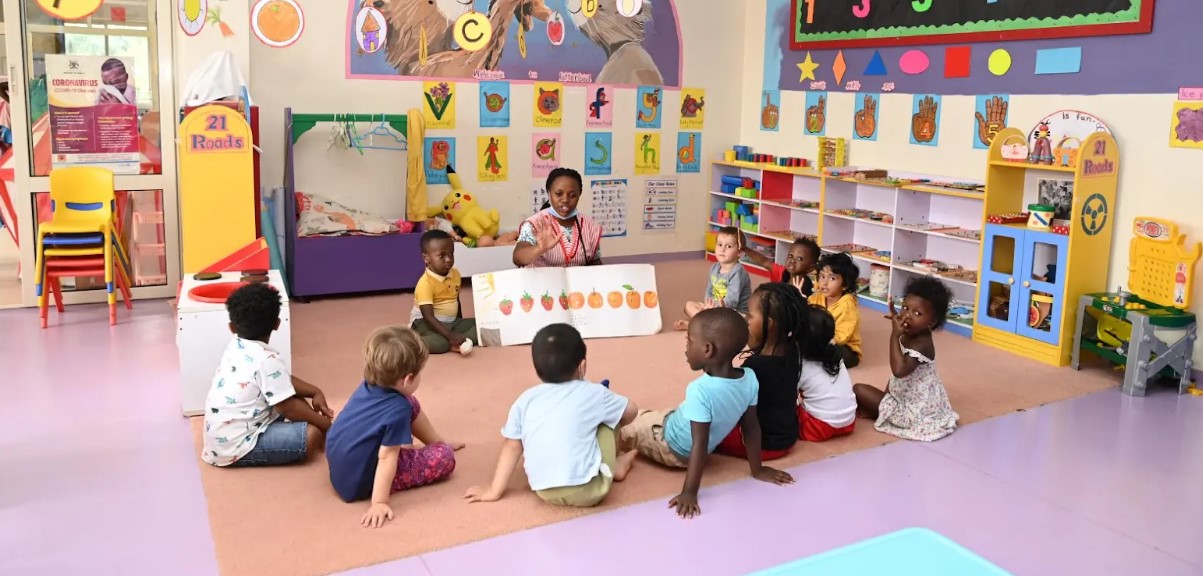pre/Kindergarten
4 YEARS TO 6 YEARS - DAILY ROUTINE
CRUCIAL AREAS OF DEVELOPMENT

Creative Development
This area supports a child to explore, share thoughts, ideas and feelings through a variety of art, design and technology, music movement, dance, imagination and role play – play activities
Knowledge and Understanding of the World
This area give opportunities that support your child to solve problems, make decisions, experiment, predict, plan and question, to explore and find out about the environment.
Communication, Language and Literacy
A child is encouraged to talk confidently, respond to adults and other children in an environment where speaking and listening are highly valued skills through exploration and use of words and text in a broad range of contexts
Personal, Social and Emotional Development
This area of learning supports the development of social skills, confidence, independence, a sense of responsibility plus a positive attitude towards learning.
Physical Development
Encourages a child to develop and practice control over large and small movements such as tearing paper, coloring, fixing puzzles, construction, running, jumping, swimming and so on.
Mathematical Development
Through a number of developmental activities, a child will be guided to sort objects according to shape, color and size, counting numbers forward and backward, identification of numbers and associating numbers to quantity.
Calendar
| KISSYFUR INTRODUCES ECO SCHOOL | |
|---|---|
| 9th – 12th January | Nature walk (creating environmental awareness) |
| 15th – 19th January | Preparing a garden |
| 22nd – 26th January | Planting seeds, stems, tubers…(how to grow plants) |
| 29th – 2nd February | Introducing 3 R’s Reduce, Re-use, Recycle |
| ALL ABOUT ME | |
| 5th – 9th February | My school (friends and the different play areas) |
| 12th – 16th February | Relating with my caretakers and friends |
| 19th – 23rd February | My feelings (happy, sad, angry…) |
| 26th February – 1st March | Here is my body (parts and functions) |
| 4th – 8th March | My sense (see, hear, feed, smell and taste) |
| 11th – 15th March | Caring for my body and my environment |
| 18th – 22nd March | Grace and courtesy |
| 25th – 29th March | Easter Week |
| 1st – 5th April | My family/my home |
| 8th – 12th April | What i would like to be when i grow up (professions) |
| 15th – 19th April | What makes my work easy (tools) |
| 22nd – 26th April | Career day (dressing up) |
| 29th April – 3rd May | |
| ECO SCHOOL | |
| 6th – 10th May | Re-use (avoid waste) |
| 13th – 17th May | Reducing (save power, water, food…) |
| 20th – 24th May | Recycle |
| LIVE HEALTHY | |
| 27th – 31st May | Meals and nutritional value |
| 3rd – 7th | June Fruits |
| 10th – 14th June | Vegetables |
| WE LOVE TO TRAVEL | |
| 17th – 21st June | Road transportation and road signs |
| 24th – 28th June | Air transport |
| 1st – 5th July | Water and railway transport |
| ABOUT ANIMALS | |
| 8th – 12th July | My pet animal |
| 15th – 19th July | Farm animals, sounds they make |
| 22nd – 26th July | Farm animals, their homes and what we get from them. |
| 29th July – 2nd August | Wild Animals |
| 5th – 9th August | Water animals/use water |
| 12th – 16th August | Underground animals |
| 19th – 23rd August | Club presentations |
| ECO SCHOOL | |
| 26th – 30th August | Living/ non living things |
| 2nd – 6th September | Food chain |
| 9th – 13th September | Insects |
| BIRDS AND INSECTS | |
| 16th – 20th September | Birds |
| 23rd – 27th September | Life cycle of a bird |
| 30th September – 4th October | Insects |
| MY WORLD | |
| 7th – 11th October | Uganda, Africa and beyond |
| 14th – 18th October | Musical Instruments |
| 21st – 25th October | Town |
| 28th Oct – 1st November | Countryside |
| 4th – 8th November | Weather conditions/seasons |
| 11th – 15th November | Environmental sounds |
| 18th – 22nd November | Location and opposites |
| 25th – 29th November | A world of colours and shapes |
| 2nd – 6th December | Celebrations |
| ECO SCHOOL | |
| 9th – 13th December | Different types of soil and making different items using clay |
| 16th – 20th December | Science week (practical activities) |